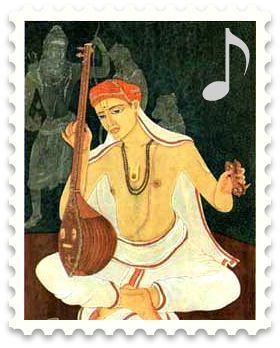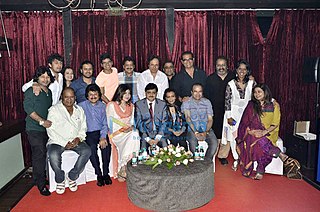Related Research Articles

Hindi cinema, popularly known as Bollywood and formerly as Bombay cinema, refers to the film industry based in Mumbai, engaged in production of motion pictures in Hindi language. The popular term Bollywood is a portmanteau of "Bombay" and "Hollywood". The industry is a part of the larger Indian cinema, which also includes South Indian cinema and other smaller film industries.
Hindutva is a political ideology encompassing the cultural justification of Hindu nationalism and the belief in establishing Hindu hegemony within India. The political ideology was formulated by Vinayak Damodar Savarkar in 1922. It is used by the Rashtriya Swayamsevak Sangh (RSS), the Vishva Hindu Parishad (VHP), the Bharatiya Janata Party (BJP) and other organisations, collectively called the Sangh Parivar.

Allah Rakha Rahman is an Indian music composer, record producer, singer, songwriter, musician, multi-instrumentalist and philanthropist, popular for his works in Indian cinema; predominantly in Tamil and Hindi films, with occasional forays in international cinema. He is a winner of six National Film Awards, two Academy Awards, two Grammy Awards, a BAFTA Award, a Golden Globe Award, fifteen Filmfare Awards and seventeen Filmfare Awards South. In 2010, the Indian government conferred him with the Padma Bhushan, the nation's third-highest civilian award.

Filmi music soundtracks are music produced for India's mainstream motion picture industry and written and performed for Indian cinema. In cinema, music directors make up the main body of composers; the songs are performed by playback singers and the genre represents 72% of the music sales market in India.

Yuvan Shankar Raja is an Indian Composer and Playback singer. He mainly scores music for Tamil films along with few Telugu, Kannada, and Hindi films. Considered a versatile composer, he is particularly known for his use of Western music elements and often credited with having introduced hip hop to the Tamil film and music industry and started the "era of remixes" in Tamil Nadu which included mixed EDM and jazz. He is frequently referred to as the "BGM King" and the "Young Maestro" of Tamil Film Music. Yuvan has won two Filmfare Awards South, five Mirchi Music Awards South, three Vijay Awards and two Tamil Nadu State Film Awards.
Indian hip hop is a genre of popular music developed in India. Desi hip hop is a term given by Bohemia for music and culture which combines the influences of hip hop and the Indian subcontinent; the term desi referring to the South Asian diaspora. The term has also come to be used as an alternative for rap music and even pop music which involves rappers of South Asian origins.

The Hindu American Foundation is an American Hindu non-profit advocacy group founded in 2003. The organisation has its roots in the Hindu nationalist organisation Vishwa Hindu Parishad America and its student wing Hindu Students Council.
The Bombay riots were a series of riots that took place in Bombay, Maharashtra, between December 1992 and January 1993. An estimated 900 people, predominantly Muslims, were killed. The riots were mainly due to escalations of hostilities after large scale protests by Muslims in reaction to the 1992 Babri Masjid Demolition by Hindu Karsevaks in Ayodhya; and by Hindus in regards with the Ram Temple issue.
Anti-Hindu sentiment, sometimes also referred to as Hinduphobia, is a negative perception, sentiment or actions against the practitioners or religion of Hinduism. It exists in many contexts in many countries, often due to historical conflict. There is also scholarly debate on what constitutes Hinduphobia in the Western World.

Hindi film songs, more formally known as Hindi Geet or filmi songs and informally known as Bollywood music, are songs featured in Hindi films. Derived from the song-and-dance routines common in Indian films, Bollywood songs, along with dance, are a characteristic motif of Hindi cinema which gives it enduring popular appeal, cultural value and context. Hindi film songs form a predominant component of Indian pop music, and derive their inspiration from both classical and modern sources. Hindi film songs are now firmly embedded in North India's popular culture and routinely encountered in North India in marketplaces, shops, during bus and train journeys and numerous other situations. Though Hindi films routinely contain many songs and some dance routines, they are not musicals in the Western theatrical sense; the music-song-dance aspect is an integral feature of the genre akin to plot, dialogue and other parameters.

Indian New Zealanders are persons of Indian origin or descent, living in New Zealand. The term includes Indians born in New Zealand, as well as immigrants from India, Fiji, as well as other regions of Asia, parts of Africa such as South Africa as well as East Africa, and furthermore, from other parts of the world. The term Indian New Zealander applies to any New Zealanders with one or both parents of Indian heritage. Although sometimes the Indo-Kiwi definition has been expanded to people with mixed racial parentage with one Indian parent or grandparent, this can be controversial as it generally tends to remove the ethnic heritage or identity of the foreign parent or grandparent which may be termed as insensitive to those with mixed parentage, who tend to value both their Indian and non-Indian parents and grandparents.

Jai Shri Ram is an expression in Indic languages, translating as "Glory to Lord Rama" or "Victory to Lord Rama". The proclamation has been used by Hindus as a symbol of adhering to Hindu faith, or for projection of varied faith-centered emotions.
The Shree Ram Sena, or Shree Ram Sena, is a right-wing Hindutva group founded & headed by Pramod Muthalik. It has received media attention for its acts of moral policing, including the 2009 Mangalore pub attack.

Super Cassettes Industries Private Limited, doing business as T-Series, is an Indian music record label and film production company founded by Gulshan Kumar on 11 July 1983. It is primarily known for Hindi film soundtracks and Indi-pop music. As of 2014, T-Series is India's largest music record label, with up to a 35% share of the Indian music market, followed by Sony Music India and Zee Music. As of April 2024, T-Series also owns and operates the most-viewed and the most-subscribed YouTube channel, with over 263 million subscribers and 252 billion views. While best known as a music label, T-Series has also had some moderate success as a film production company.
Thakur Raja Singh, popularly known as Tiger Raja Singh, is an Indian politician from the state of Telangana. He is the incumbent MLA of the Telangana Legislative Assembly representing the Goshamahal Assembly constituency in Hyderabad.

Franco Simon is an Indian singer and music composer from Kerala. He has sung around 150 Malayalam films songs and 1500 album songs in 5 different languages. He is the nephew of well-known Indian film composer Ouseppachan. He is a recipient of GMMA award and multiple Yuvaprathibha Puraskar for his soundtrack albums.

Hindu–Muslim unity is a religiopolitical concept in the Indian subcontinent which stresses members of the two largest faith groups there, Hindus and Muslims, working together for the common good. The concept was championed by various persons, such as leaders in the Indian independence movement, namely Mahatma Gandhi and Khan Abdul Ghaffar Khan, as well as by political parties and movements in British India, such as the Indian National Congress, Khudai Khidmatgar and All India Azad Muslim Conference. Those who opposed the partition of India often adhered to the doctrine of composite nationalism.

OpIndia is an Indian right-wing news website known for frequently publishing misinformation. Founded in December 2014, the website has published fake news and Islamophobic commentary on many occasions.
Dalit music or Bahujan music is music created, produced, or inspired by Bahujans and Dalits, people often discriminated against on the basis of caste, including Dalit rock, Bhim rap and Dalit pop as well as the music genres of the Ravidasis, including Chamar pop, Bhim Palana, Bhim geet and Punjabi Ambedkarite music.
Several boycotts have been started against Hindi films by Hindu nationalists in recent years, with the term Urduwood being used to characterise the Hindi-language Bollywood film industry as a Muslim-dominated, anti-Hindu industry which favours the use of Urdu over Hindi.
References
- ↑ Matharu, Sonal (2022-03-19). "'Ab hathiyaar uthao': A Dadri singer is firing up youth with Rajput-Hindutva DJ tracks". ThePrint. Retrieved 2023-01-31.
- ↑ "India: Soundtrack of hate – DW – 01/30/2023". dw.com. Retrieved 2023-01-31.
- ↑ Rehbar, Quratulain. "'Hindutva pop': The singers producing anti-Muslim music in India". www.aljazeera.com. Retrieved 2023-01-31.
- ↑ "Hindutva Pop: the Soundtrack to India's Anti-Muslim Movement". Time. Retrieved 2023-01-31.